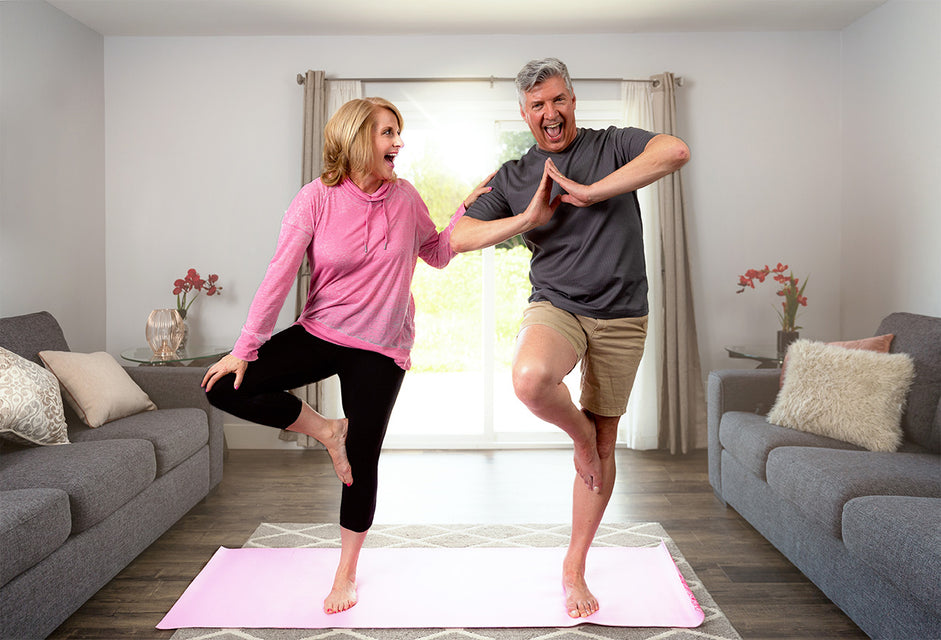People engage in regular exercise for a variety of reasons, from weight loss and muscle gain to improving energy.
Physical activity and exercise have countless benefits for our health; in addition to helping you lose unwanted weight, gain muscle, and boost energy levels, exercise also helps to improve your immune system function, manage chronic and metabolic diseases, and increases mental health.
One of the lesser-known benefits of exercise is its role in fighting aging and the associated adverse effects. Read on to learn about what the research says regarding the connection between exercise and aging and tips on building an antiaging exercise routine.
What is Aging, Really?
In our day-to-day lives, we use the term “aging” to refer to the years that go by since birth (chronological age); in other words, it is a term synonymous with getting older. In this sense, the experience of aging is often accompanied by expected changes in movement abilities, wrinkles, and health.
In scientific terms, aging has a different connotation. On a microscopic level, aging can be observed in our cells and tissues, and it can affect our health and the function of the body as a whole.
Both microscopic and whole-body aging are connected. When our cells and tissues age, they accumulate damage and have impaired function. When millions and billions of cells have impaired function, diseases, pain, and discomfort develop.
While aging, from a scientific perspective, is correlated with chronological age, multiple other factors also influence cellular aging. As a result, aging can occur faster or slower in time.
Human lifespan has lengthened considerably over the past 100 years; unfortunately, so has chronic disease prevalence. The development of chronic diseases is directly correlated with the effect of cellular aging. For this reason, cellular aging researchers are shifting their focus toward ways to increase the healthspan, or the number of healthy years we experience throughout our lifetime.
How do we increase our healthspan? Fortunately, most approaches to increasing our healthspan use the same lifestyle techniques to prevent disease and feel healthier, including a balanced diet and regular exercise.
The Role of Fitness in Fighting Aging
Engaging in regular exercise can be part of an effective antiaging strategy. A recent systematic review made several conclusions as to how exercise and fitness affects the aging process of different organs and tissues. It found that engaging in between 2.5 hours (150 minutes) and 33 hours (2000 minutes, similar to the time a professional athlete might dedicate to physical activity) of combined aerobic and resistance exercise weekly had the following effects:
- An increase in executive function and memory (neurogenesis, neurotrophins, growth factors, synaptic markers)
- Decreased inflammation
- Decreased depression and anxiety
- Increased VO2 max (a measure of efficient oxygen use during respiration)
- Increased energy production (gluconeogenesis)
- Increased fatty acid metabolism
- Increase glucose uptake
- Increased muscle endurance
- Decreased muscle loss due to aging (sarcopenia)
- Increased cell functional capacity
- Increased heart cell function
- Decreased oxidative stress on circulatory system cells
- Decreased insulin secretion
- Increased glucagon secretion
- Increased blood stem cell production (hematopoietic stem cells)
- Decreased osteoporosis
As you read through the benefits of exercise for your health, it is clear how the antiaging benefits of exercise on organs and systems influence your overall health, including lowering your risk of developing chronic disease.
Another study found that individuals living with obesity who lost 10% or greater of their weight and maintained it through exercise and a balanced diet showed a lengthening of telomeres; telomere shortening is a sign of aging.
Additionally, with exercice, the rate of aging due to environmental factors can be slowed down and even be avoided.
3 Tips For Using Exercise to Fight Aging
Avoid Sedentarism
Just as exercise can be part of a strategy to slow or stop the aging process, a lack of exercise and physical activity in people with sedentary lifestyles accelerates aging.
Unfortunately, urban lifestyles often favor sedentarism.
Even if you don’t enjoy planned exercise, try to stay active throughout the day. Some ideas include getting a standing desk, taking a walk before or after meals, and biking to work.
Engage In At Least 150 minutes of Exercise Weekly
Most studies that make the connection between the antiaging effects of exercise include individuals who carry out at least 150 minutes of exercise or physical activity weekly. 150 minutes weekly, which equates to 30 minutes daily for five days a week, is the minimum recommendation of moderate physical activity weekly established by the World Health Organization.
Work on making a plan to set aside at least 30 minutes daily of exercise at least five out of seven days a week. The benefits increase with intensity and time, as long as its within your fitness level.
Combine Aerobic and Resistance Exercise
Aerobic exercise, which is commonly referred to as “cardio”, increases your heart and breathing rate. It generally has some muscle engagement but is more focused on heart rate rather than strength. Resistance exercise, on the other hand, focuses on muscle activation and strength building. Both forms of exercises are important as part of an antiaging fitness plan as they engage different cells and bodily systems.
This is in line with the World Health Organization guidelines that state that, to take advantage of the health benefits of exercise, individuals should carry out resistance exercise at least twice weekly in addition to 150 minutes of aerobic exercise.
Conclusion
There are dozens of reasons for people to make exercise a part of their daily lives. The antiaging benefits of exercise may be among the most rewarding, as it demonstrates how physical activity can be part of a strategy that literally adds years of health to your life.
Whatever the reason that motivates you to exercise, focus on that and keep at it. Your entire body and mind will thank you.

Leave a comment